
by David Levinson
When Gideon contacted me about taking on the reviews for IF, I took President Roosevelt’s words to heart and said, “Yes.” It’s tougher than it looks. I’m stretching some mental muscles I haven’t used in some time.
New Beginnings
March is a good time for new beginnings. Spring isn’t quite here yet, but its promise is apparent. Depending on where you live, the crocuses may have started to bloom, or at least the snowdrops. And until Julius Caesar reformed the Roman calendar almost exactly 2,000 years ago, it was the first month of the year (which is why our ninth, tenth, eleventh, and twelfth months are named Seven, Eight, Nine, and Ten). It even stuck around as the first month for some into the Eighteenth century under the Old Style.
So what’s new? Well, we have another new country: The Gambia. This tiny nation on the west coast of Africa was granted independence by Great Britain on February 18th. It closely follows the lower course of the Gambia River to its mouth on the Atlantic and is surrounded on three sides by Senegal. I wouldn’t rush out to buy a new map or globe any time soon. There are still plenty of colonies in Africa and elsewhere around the world seeking their independence.

The Duke of Kent at the official opening of Gambia High School during the independence celebrations
There’s also a new measles vaccine. Unlike the current vaccine, which requires a series of shots, this requires only a single injection. Fewer injections are bound to be a relief to children and their parents.
A little closer to the interests of the Journey, MGM has announced that Stanley Kubrick (Spartacus, Dr. Strangelove) is working on a science fiction film, tentatively to be called Journey Beyond the Stars. There isn’t much information at this time. It will be shot in Cinerama, and Arthur C. Clarke is apparently involved in some fashion. Maybe we can dare hope for more than ray guns and schlocky monsters.

Stanley Kubrick in the Dr. Strangelove trailer
What about IF?
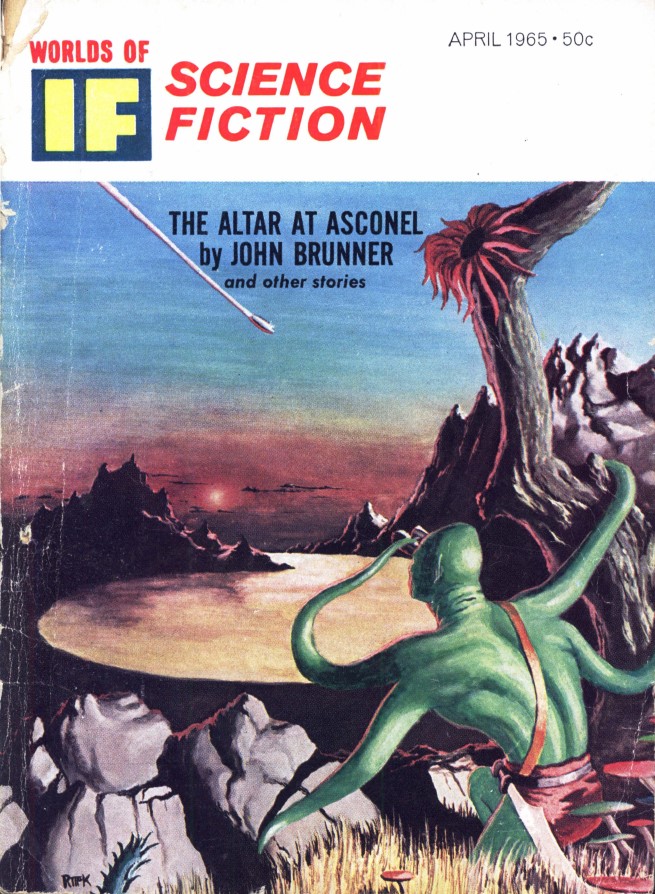
Art by McKenna
Are we getting anything really new this month? Has Fred Pohl started to turn the decline in quality around? The answers are “A little” and “Not really”. As for the first question, five of the six authors in this issue are new enough that the Journey actually covered their first story. (Well, in the case of this month’s first time author you’ll have to wait a few paragraphs for that to be true.) For the second, read on.
The Altar at Asconel (Part 1 of 2), by John Brunner
Brother Spartak, a monk in a scholarly order on Annanworld, is just about to begin writing a history of his homeworld of Asconel, when he is interrupted by the arrival of his brother Vix. It turns out that these two are brothers to Hodath, the Warden of Asconel, who fell victim to a coup staged by the leaders of a cult (one of whom is a telepathic mutant) from the world of Brinze which worships Belizuek. Neither Brinze nor Belizuek is known to the monastery’s encyclopedic computer. The two leave, first to find their remaining brother, Tiorin, and then to make contact with the resistance in the Asconel system. But before leaving, Spartak is reminded by his abbot that he took a vow of non-violence and that committing a single violent act will forever bar him from returning.
Aboard his ship, Vix is attacked by an assassin. Spartak is able to stop the attack by rapidly reversing the ship’s artificial gravity. (Is slamming someone repeatedly into various surfaces not an act of violence, just because you only twisted a dial?) We also meet Vix’s mistress, Vineta, and learn that Vix is hot-headed and occasionally verbally abusive to her.
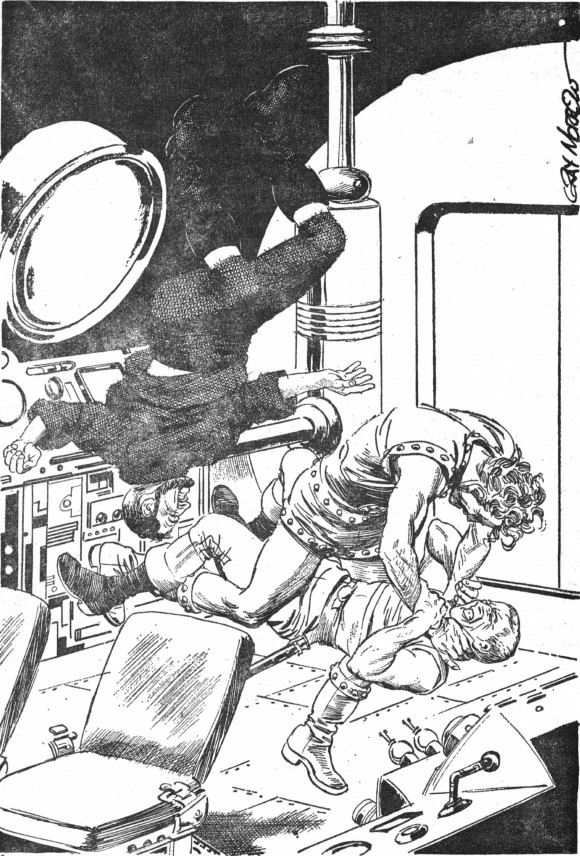
Art by Gray Morrow
They travel to Delcadore, hoping to get a lead on their brother. There, the ship is impounded by the Imperial bureaucracy and the brothers are dragooned into taking a telepathic mutant to the world of Nylock. They are psychologically conditioned to fulfill their assignment, but are able to delay take-off long enough to make contact with Tiorin and for him to come aboard. The delay is brought about by Spartak pointing a weapon at an administrator and threatening to shoot a bunch of people. (Is that an act of violence if he didn’t actually mean to go through with it?)
The mutant, a teenage girl named Eunora, is brought aboard in an artificially induced catatonic state. Spartak insists on bringing her out of it, and a few days later, she breaks the conditioning of the others. However, she has no interest in going to Asconel and is planning to condition them herself to take them where she wants to go. Once she figures out where that is.
That’s really not a lot of action for 47 pages. The rest is taken up by exposition. Some good, some of the “As you know, Bob” variety. We learn that there is a galaxy-wide human empire, but it is in decline, gradually contracting its borders. A few places that have left the empire, such as Asconel and Annanworld, have retained imperial values and systems, but others have lapsed into piracy and barbarism. The empire is nearly 9,000 years old and the ships are even older, created by an ancient vanished race and found by humans when they first ventured out to the stars.
John Brunner is the grand old man of this issue, having been writing since the early 50s. He has apparently written a couple of things in this setting before. The Brunner I’ve read before has been closer in tone to the newer British style. This is pure space opera. As is typical of space opera, the women characters don’t do too well. Vineta submits weakly to Vix’s abuse, though she may be developing an interest in Spartak, and there are at least some hints at a bit of depth. We don’t see much of Eunora, but she’s not off to a good start. The only other woman is the bureaucrat, described repeatedly as fat and foolish.
Despite the excessive exposition and reliance on coincidence, a tentative three stars for readability and some decent writing in spots.
What T and I Did, by Fred Saberhagen
An amnesiac wakes imprisoned in a Berserker. One eye is bandaged, and he assumes he is horribly disfigured, because the others trapped with him seem to be repelled by him.
It’s difficult to say much more about this without giving the whole thing away. If you read “The Stone Place” last month, the answer to at least some of the mystery will be obvious, but that’s far from the whole story.
This is Saberhagen’s fifth story about the dreaded Berserker killing machines. Clearly he does have more he can say with the Berserker stories, but I would like to see him stretch his legs a little more with something else. A solid, high three stars.
Across the Sea of Stars, by Jeff Renner
This is a poem which uses the title of at least one science fiction work in every line. The meter here (when the author sticks to it) is the sort of sing-song I associate with bad children’s poetry. The only good thing is that the poem is barely longer than the list of authors offered an apology. Renner had another bad poem in F&SF in March of last year. He shouldn’t quit his day job. One star for me, maybe two if you enjoy the game of figuring out how many of the referenced works you’ve read.
Gree’s Hellcats, by C.C. MacApp
Colonel Steve Duke is back. During a boring (for the reader) space battle, he learns that the Gree has a new species working for it. From pictures he took, the bird people figure out that these are “upgraded” animals. Col. Duke is once again sent behind enemy lines to investigate.

Art by Nodel
Once again, he spends some time in the bush. Once again, he waltzes into the enemy base by pretending to be wounded. After crawling around in the ductwork, he eventually locates some electronic devices being implanted in the creatures’ horns. He steals one and has the brilliant (read: blindingly stupid) idea of trying it out on himself. It proves to be some sort of computer-aided thinking device that also punishes thoughts against the Gree. Steve steals a spaceship with the aid of the device. The end.
Why hellcats? A reference to the Grumman F6F? The M18 tank hunter? The 12th Armored Division? Hellcats of the Navy starring Ronald Reagan? Mary Todd Lincoln? Who knows? Or cares? I’m not sure even the author does.
MacApp has written some decent stuff. “A Guest of Ganymede” comes to mind. Even the first of the Gree stories wasn’t bad, but this and the previous installment have been awful. If MacApp must write space opera, might I suggest a sequel to “Under the Gaddyl”? Two stars and no more Gree, please.
Our Martian Neighbors, by John McCallum
An astronaut has crashed in the Martian desert. After days struggling through the heat, he comes upon a glass dome. In it are two children and their mother. He can hear them speaking, but they can’t hear him desperately pleading for water.
McCallum is this month’s new author. He shows some skill, but the story is very unpleasant. Imagine a Mars story written by an evil Ray Bradbury. I’ve no idea why this got the cover. Well written, but only two stars for egregious cruelty and not really having a point.
White Fang Goes Dingo, by Thomas M. Disch
In 1970, the Masters, beings of pure energy, came to Earth. They took over the power grid and made pets of some humans, especially the beautiful and artistic. They use the Leash, some sort of electric stimulation of the pleasure centers of the brain, and the pets are eager and glad for it. It is now a few generations later.
Our protagonist is known at various times in his life as Dennis White, White Fang, and Cuddles. He is the son of Tennyson White, who wrote a very popular book about Masters and pets through the allegory of dogs. A few years after White Fang’s birth, his mother left for another solar system and his father was captured and killed by wild humans, also called Dingoes. White Fang and his brother Pluto live in a poorly run kennel for a few years and are then adopted by a Master after meeting a human girl, Julie, on an abandoned farm. A decade later, White Fang and Julie are let off the leash while visiting Earth, but their Master never returns. Eventually, they are captured by Dingoes and get to see what is left of human civilization.
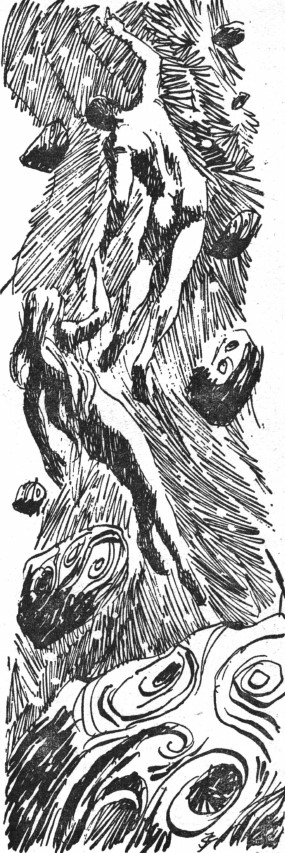
Art by Gaughan
You might expect this to be a broad comedy from the title. It isn’t. There is humor and satire here, but it’s subtle. The story is up to Disch’s usual standards, but might need more room to really develop. It’s either too long or too short. I can’t quite decide. A very high three stars; it’s missing that certain something to get a fourth.
Wrapping it up
So, are there signs of Pohl righting the ship? Not really. These are hoary old clichés for the most part. Space opera, a hostile but habitable Mars, humanity enslaved by aliens. Only Saberhagen and Disch do something new and different with them. Maybe Brunner will, too, but not this month. Come on, Fred. Don’t make me regret taking this gig.
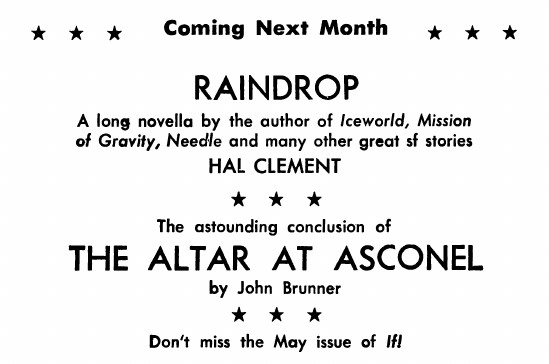

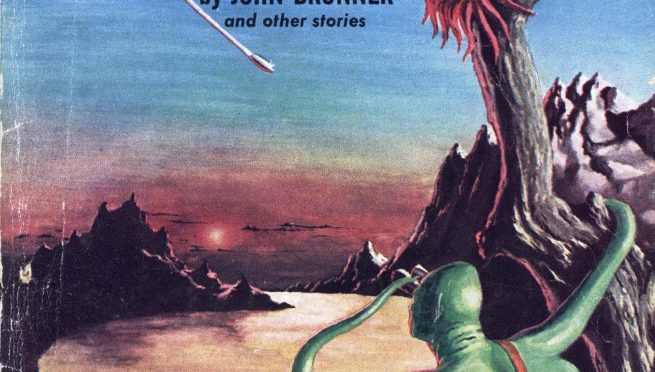

First of all, welcome aboard. A fine article, indeed, and that's not just because I seem to be in agreement with everything you say.
"What T and I did" was pretty good, if a one-idea story, and quite short. Interesting use of different narrative points of view, like a simpler version of Bester's "Fondly Fahrenheit."
"Gree's Hellcats" made me think "Didn't I just read this?" It's much too similar to the previous story in the series.
You hit the nail on the head with "Our Martian Neighbors." It's like a poor version of "Mars is Heaven!"
"White Fang Goes Dingo" was enjoyable, mostly for the author's tongue-in-cheek, sardonic tone.